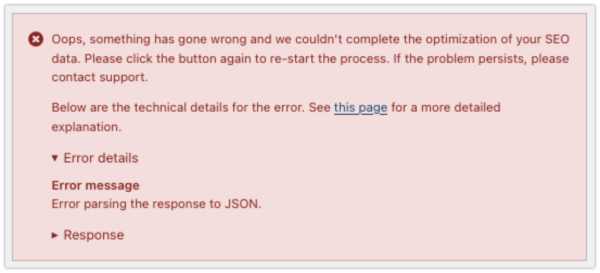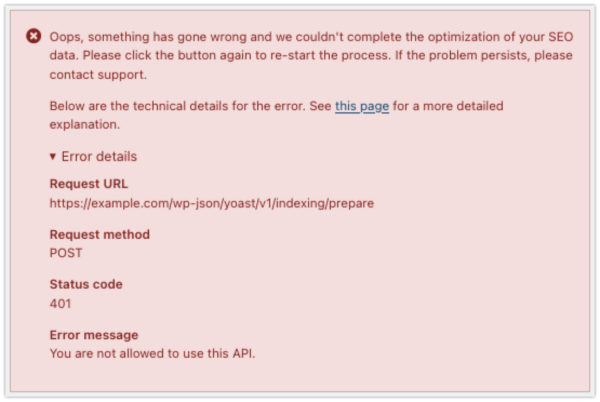We couldn’t complete the optimization of your SEO data: A technical guide
To optimize your websites’ SEO data, our plugin keeps a list of relevant data on your site that we can quickly access when needed. We dub this data the indexables.
Normally, data gets added to the indexables as soon as you create or update a post. However, when you newly install our plugin, or when some data doesn’t get indexed for some reason, we include the option to kickstart the creation of indexables with the SEO data optimization feature. If this process fails, you”ll see the error: Oops, something has gone wrong and we couldn’t complete the optimization of your SEO data. This article will describe the most common causes for this error.
Why did I get an error for the SEO data optimization?
Kickstarting the creation of our indexables can be a taxing process. The larger the site, the longer this process may take. Due to the nature of this process, sometimes this process may fail. You’ll see a technical summary with the error message to help you solve the problem.

Specific error messages
There may be a specific error message related to SEO data optimization, like the one described below.
Error parsing the response to JSON
Having debugging enabled on your website will most likely cause this error as it will cause any unrelated or less important notices and warnings to interfere with our communication with the website. You can read more about WordPress debugging.
This error most likely means that your website had problems while trying to fulfill the request. When you open up the response in the message, you should find the information that your server sent in response to our request. You can use this information to determine what went wrong.
Specific status codes
You may also get a status code in your error message. What does that code mean?

Status code 301 / 302
301 and 302 are status codes that indicate that a request is being redirected. Something in your site redirects this request away from the correct WordPress API endpoint. See if disabling any redirection plugin fixes this, or maybe your web server handles this.
Status code 401 / 403
These status codes deal with requests that are blocked or unauthorized. This means that something in or in front of your website is blocking our requests to the WordPress API. Some Web Application FireWalls utilize rules that may block some of these requests. This status code will also show up if you’ve completely disabled the WordPress API.
Status code 500 through 503 and 504
These status codes indicate that something went wrong within your website while processing our optimization. You should be able to get more information from your websites’ PHP error logs. 504 indicates a timeout. This may indicate there’s an endless loop happening or a lot of data is being processed, which can’t finish before your server terminates the process.
Known cases that will give an SEO data optimization error
If an error occurs for multiple users, we will provide a summary and solution below.
Case 1: Web Application Firewalls (WAF) blocking (part of) the endpoint
WAF may block part of the REST requests, that our plugin needs to fulfil. You will see the 401 / 403 status code with a message that you can’t use that endpoint. One specific WAF that blocks part of our requests is Comodo. If you experience issues and use that WAF, try (temporarily) disabling the WAF to resolve the problem.
Need additional help?
If you can’t find the cause of the error with this article, we’re here to help. Are you a Premium customer? Then you can contact our support team. If you are a free user, you can ask your question on the free support forums. Whichever method you use, always provide as many details as possible, including the error details.
Did this article answer your question?
Still having issues?
Try searching for your issue below

